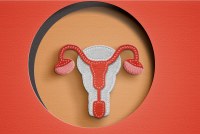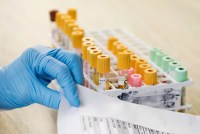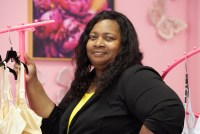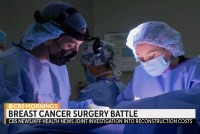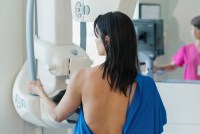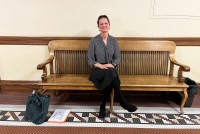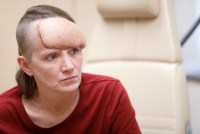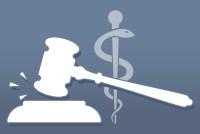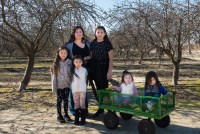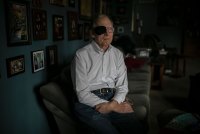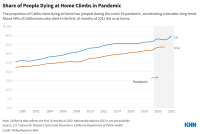Latest KFF Health News Stories
Mississippi’s Cervical Cancer Deaths Indicate Broader Health Care Problems
Mississippi has among the highest cervical cancer mortality rates in the U.S. When low-income women can’t afford regular preventive care, much less gynecological visits, this highly preventable and treatable cancer becomes a killer.
Pruebas de sangre para detectar cáncer generan esperanza, pero también preocupación
Muchos expertos dicen que aún no está claro si las pruebas hacen más bien que mal, y que tener una ya disponible comercialmente les preocupa.
A Blood Test That Screens for Cancer: Does It Do More Harm Than Good?
The first of a new wave of cancer-detection blood tests likely saved Gilbert Milam Jr.’s life. But many cancer researchers, wary of overtesting, argue it’s premature to prescribe the Galleri test widely.
Pioneering Study Links Testicular Cancer Among Military Personnel to ‘Forever Chemicals’
The military first documented health concerns surrounding chemicals known as PFAS decades ago yet has continued to use firefighting foam made with them. Despite scores of lawsuits by its personnel and high rates of testicular cancer among troops, it has been slow to investigate a connection.
Mujeres negras sopesan riesgos emergentes de alisadores para el cabello “adictivos”
Los alisadores pueden contener carcinógenos, como agentes liberadores de formaldehído, ftalatos y otros compuestos que alteran el sistema endócrino, según estudios de los Institutos Nacionales de Salud.
Black Women Weigh Emerging Risks of ‘Creamy Crack’ Hair Straighteners
Social and economic pressures have long compelled Black girls and women to straighten their hair. But mounting evidence shows chemical straighteners — products with little regulatory oversight — may pose cancer and other health risks.
‘We’re Not Doing That’: Why a Black Couple Wouldn’t Crowdfund to Pay Off Medical Debts
Kristie Fields, a cancer patient in Virginia, was urged to go public to seek financial help. She worried about feeding hurtful stereotypes.
El cisplatino y el carboplatino son algunos de los medicamentos que escasean, así como otros 12 contra el cáncer, pastillas para el trastorno por déficit de atención con hiperactividad, anticoagulantes y antibióticos.
Drugmakers Are Abandoning Cheap Generics, and Now US Cancer Patients Can’t Get Meds
A quality-control crisis at an Indian pharmaceutical factory has left doctors and their patients with impossible choices as cheap, effective, generic cancer drugs go out of stock.
How a Medical Recoding May Limit Cancer Patients’ Options for Breast Reconstruction
The federal government’s arcane process for medical coding is influencing which reconstructive surgery options are available, creating anxiety for breast cancer patients.
Mammograms at 40? Breast Cancer Screening Guidelines Spark Fresh Debate
There is no direct evidence that screening women in their 40s will save lives, yet modeling suggests expanding routine mammography to include them might avert 1.3 deaths per 1,000. Highlighting the risk of false positives, some specialists call for a more personalized approach.
¿Mamografías a los 40? Nueva pauta para la detección del cáncer de seno genera debate
Algunos médicos e investigadores que están interesados en un enfoque más individualizado para encontrar tumores problemáticos se muestran escépticos y plantean preguntas sobre los datos y el razonamiento detrás del cambio radical del Grupo de Trabajo de Servicios Preventivos de Estados Unidos
Montana Considers Requiring Insurance to Cover Fertility Preservation for Cancer Patients
Young cancer patients must act quickly to preserve their sperm and eggs once they get their diagnosis, and many can’t afford the cost.
Para pacientes de cáncer sin seguro, conseguir atención médica es una lotería
Los estudios demuestran que, a veces, los adultos sin seguro retrasan la atención, lo que puede perjudicar las probabilidades de supervivencia. Pero que los pacientes obtengan un seguro para cubrir el tratamiento se parece un poco al juego de la ruleta, es decir, depende de dónde vivan y del tipo de cáncer que padezcan.
For Uninsured People With Cancer, Securing Care Can Be Like Spinning a Roulette Wheel
When uninsured people are diagnosed with cancer, accessing resources and paying for treatment can be daunting. The safety nets meant to help often fall short, say cancer physicians and health policy experts who study access to care. Some patients find it easier to play the odds.
La decisión podría afectar los exámenes de detección sin copago y servicios preventivos similares que la mayoría de los estadounidenses con seguro tienen como parte de sus planes de salud.
Judge’s Decision Would Make Some No-Cost Cancer Screenings a Thing of the Past
A U.S. District Court ruling overturned the section of the Affordable Care Act that makes preventive health services — from colonoscopies to diabetes screenings and more — available at no cost to consumers.
California’s Massive Medicaid Program Works for Some, but Fails Many Others
Medi-Cal serves more than one-third of the state’s population — offering a dizzying range of care to a diverse population. In the new “Faces of Medi-Cal” series, California Healthline will assess the program’s strengths and weaknesses through the lives and experiences of its enrollees.
When Medicare stops paying for a pricey drug that prolongs life, an Ohio man considers giving up treatment to spare his family enormous debt.
More Californians Are Dying at Home. Another Covid ‘New Normal’?
The proportion of Californians dying at home, rather than in a hospital or nursing home, accelerated during the pandemic, a trend that has outlasted the rigid lockdowns linked to the initial shift.



